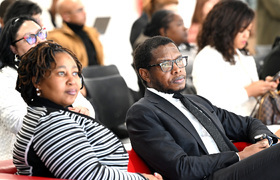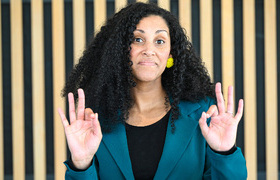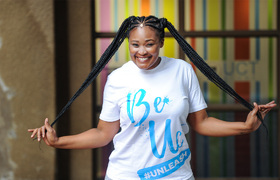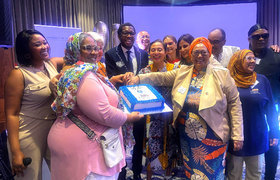Turning a lived experience into advocacy
03 September 2025 | Story Lyndon Julius. Photo Lerato Maduna. Read time 6 min.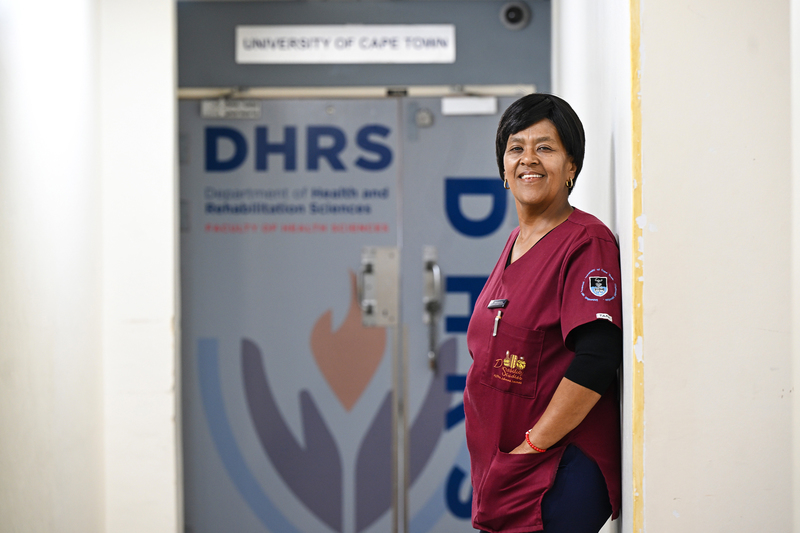
The inspirational story started with Deborah van der Berg being a carer for her disabled father, leading her up the path to the Disability Studies programme in the University of Cape Town’s (UCT) Department of Health and Rehabilitation Sciences. The journey further led to a life dedicated to disability advocacy, inclusion, and community empowerment. She will be graduating with a higher certificate in disability studies next week.
Deborah’s motivation to pursue disability studies began at home. Her father became a quadriplegic after an accident at age 30, and for 12 years she supported him as his primary carer.
“It was on-the-job training,” she said. “I didn’t know anything about disability at the time, but I had to learn – not only how to assist him, but how to see the person beyond the disability. That experience enriched me and allowed me to build a relationship with my father in a very unique way.”
She believes that people with disabilities must be at the forefront of shaping their own futures, and that communities are enriched when they embrace diverse abilities.
“When we create spaces that are truly inclusive, we don’t only change individual lives – we transform societies.”
“Disability should never define the limits of someone’s contribution,” Deborah said. “When we create spaces that are truly inclusive, we don’t only change individual lives – we transform societies.”
Her outlook is grounded in her lived reality. Having supported her father through quadriplegia, she learnt the value of patience, dignity, and perseverance. Now, she channels those lessons into creating opportunities for others to thrive.
Building community in Pelican Park
Deborah has channelled that resilience into her community. She started a disability group in Pelican Park that brings together people with diverse conditions – from cerebral palsy and the effects of strokes to visual impairment and polio.
The group organises activities such as wheelchair races and long cane walks, while members also participate in the Chaeli Dancing Club.
“Too often people with disabilities are isolated,” she explained. “By connecting, they realise they’re not alone. They can share experiences, support one another, and feel included in community life.”
“Sometimes the biggest victory is simply helping someone feel seen.”
Looking ahead, Deborah is determined to advocate for greater employment opportunities in government and to ensure that constitutional rights for persons with disabilities are meaningfully implemented.
The Pelican Park initiative, for instance, has become more than a social gathering. It is an opportunity for awareness-raising, skills-sharing, and collective involvement. By bringing people together across different disabilities, she has shown how solidarity can counteract isolation.
“Sometimes the biggest victory is simply helping someone feel seen,” she noted. “That moment when a person realises they are not invisible, that they are valued, heard, and capable of more than they thought is what keeps me going.”
Learning, dancing, and signing
Her involvement has extended to the Chaeli Sports and Recreation Club, where she was invited to partner with a deaf-blind dancer. To prepare, Deborah learnt South African Sign Language (SASL), a skill that now enriches her advocacy.
“The degree taught me to see through different lenses,” she said. “There are two disabilities: the one a person lives with, and the one society imposes by not being inclusive. My work is about encouraging people to look beyond both.”
Sport, surf, and the spirit of inclusion
Sport has become another avenue for change. As a UCT ParaSport volunteer, Deborah has witnessed first-hand the power of inclusive sport codes such as goalball, blind soccer, and wheelchair rugby.
“When you put on the blindfold and play, you understand that disability is only a part of who someone is,” she said.
Her volunteering extends to Muizenberg, where she supports the Roxy Surf Therapy programme. There, she assists wheelchair users by pushing specialised beach chairs to the water’s edge.
“Watching how patiently and carefully the pro-surfers handle each participant inspired me,” she said. “I wanted to be part of that process.”
Motivation and challenges abound
Balancing her studies with volunteer work is not a struggle, she insisted. “Disability is in my DNA. It’s what I live for.”
What keeps her motivated, she added, is service: “I’m rendering a service to the most vulnerable in society – and witnessing that nothing is impossible.”
Challenges remain, particularly around transport and accessibility. Yet she approaches setbacks with optimism and advocacy: “When things don’t go as planned, I confront them kindly, then brush them off. The community always stands together.”
People who inspire
Among the people who have shaped her journey, Deborah credits her coach, Dr Muya Koloko, who introduced her to parasport in 2018; Professor Theresa Lorenzo, the founder of UCT’s Disability Studies programme; and Chaeli Campaign leaders, Michaela and Zelda Mycroft.
She also highlights ballroom coaches Michaela Mycroft and Chantelle le Roux, whose patience and encouragement have helped her “glide over the dance floor in glittering outfits on competition days”.
Deborah hopes to expand her work, grow awareness of invisible disabilities such as autism and bipolar disorder, and foster dialogue across society.
“Communities should have inclusive dialogue with various stakeholders in a holistic way. It’s about ensuring participatory collaboration in decision-making for all members of society.”
 This work is licensed under a Creative Commons Attribution-NoDerivatives 4.0 International License.
This work is licensed under a Creative Commons Attribution-NoDerivatives 4.0 International License.
Please view the republishing articles page for more information.







